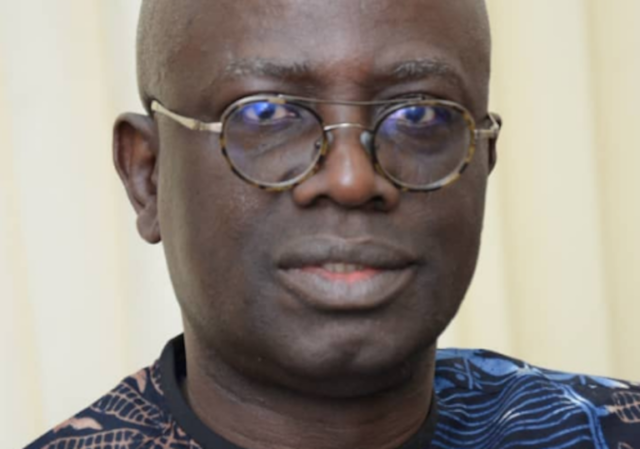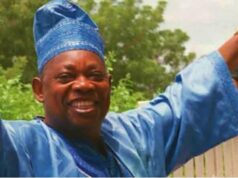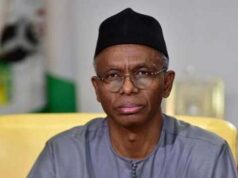On the eve of last Saturday’s gubernatorial election in Ondo State, Tokunbo Ajasin, son of Second Republic Governor of the old Ondo State (now Ondo and Ekiti States), predicted what would happen. “I believe the incumbent will win. There is no strong opposition, and the APC (All Progressives Congress) candidate is the incumbent,” the 75-year-old scion of the late Michael Adekunle Ajasin told PUNCH newspaper. He then summed up the factor that would determine the outcome: “Ordinarily, the performance of the APC at the national level could have some effect but you know the way things are, nobody looks at performance. It is about whether you can take care of stomach infrastructure. That is the state we are in. If you are not able to take care of stomach infrastructure, I don’t know how you will win. The APC being in power will be able to do that sufficiently.”
That was exactly what transpired last Saturday in a contest in which votes were openly traded between operatives of leading parties and the Ondo electorate. A viral video from the election shows a female voter saying the process was free, fair and devoid of violence but that they all collected money for their ballot. Indeed, tales abound of how political undertakers invaded the polling stations with cash (and mobile phones for online bank transfers) to negotiate the price of a vote that went from between N3,000 and N20,000 depending on the location.
But for those expressing indignation, this is just a mere replay of an old game. A research paper is on the website of the National Institute for Legislative and Democratic Studies (NILDS) titled, ‘Vote Buying and its Implication on Democratic Governance: A Case Study of Ondo State 2020 Governorship Election.’ According to the researcher, Adebayo Zaka Jimoh, while Ondo electorates “are aware of the damage electoral corruption can do on democracy, they continue to accept bribes during elections as witnessed in the case study.”
As I stated earlier, there is nothing new in what happened last weekend in the state or in 2020. Eight years ago, after the election that brought the late Governor Rotimi Akeredolu to power, I wrote, ‘Pot of Soup Democracy’. Below are excerpts from that column, first published on 1st December 2016. Readers can then draw their own conclusions before I get to mine.
================================================
The Ondo State gubernatorial election has come and gone and by most objective accounts, the votes were properly cast, they were counted, and they count—at least to the extent that majority carried the day. We must commend the outgoing Governor Olusegun Mimiko for his maturity in congratulating the winner and all the contenders for displaying sportsmanship. Of course, the Peoples Democratic Party (PDP) has promised to go to court, but if the party leaders are honest with themselves, they will accept responsibility for their woes and begin to put their house in order.
Notwithstanding, there was something about the election that should worry us, and this has been highlighted also in many reports: the transparent buying and selling of votes by agents of the parties, with the main culprit being the PDP that currently controls the state and the APC that is in power at the centre. According to reports, at most of the polling units, agents of the APC and PDP engaged one another in what my brother, Ferdinand Agu (now of blessed memory), once described as a game of “financial shootout” in which victory is almost always to the highest bidders.
The apostle of ‘stomach infrastructure,’ Governor Ayo Fayose of Ekiti State has alleged that the Ondo election was fought on the basis of “Dibo ko se ‘be” (vote for our candidate guarantee for yourself a pot of soup). While vote buying may not be a new phenomenon in Nigeria, most reports indicate that it was taken to a new level last weekend in Ondo State. Meanwhile, it is interesting that ‘pot of soup’ is fast becoming the defining metaphor for this season. When examined critically, there is only one conclusion to draw from the unfortunate Ondo spectacle: those buying the votes and the ballot sellers were united by the quest for a ‘pot of soup.’
While the voters were desperate to satisfy their immediate hunger, those buying the votes were thinking more of a lifetime of feeding frenzy at public expense. As things stand, most of the people elected to public offices at various levels are not thinking about the welfare of the people, they are only concerned about their own ‘pot of soup.’ And because of that, they bait voters with what could only satiate for a day while plotting for themselves a lifetime of opulence. That is the real essence of “Dibo ko se ‘be”.
In addressing the poser, “why do politicians buy votes?”, Razvan Vlaicu, a senior research economist at the Inter-American Development Bank’s Research Department, argues that it happens in countries where political parties fail to build brands capable of convincing voters that their electoral promises can be trusted. “Citizens, especially the poorest and most marginalized, can come to see the disbursement of cash before elections as the one and only thing they get from an ineffectual government,” Vlaicu wrote. “They can come to depend on it. As a result, a vicious circle emerges. Those who suffer most from corruption become paradoxically those least likely to oppose it.”
The idea of the social contract theory on which government is founded, according to Jean Jacques Rousseau, “may be stated simply: Each of us places his person and authority under the supreme direction of the general will”. But what happens in Nigeria today is a situation where most elected public officials believe they are in no way accountable to the people. However, by helping unscrupulous politicians to power, those who accept gratification for their votes are also putting their future and that of their children in jeopardy…
ENDNOTE: I wrote the foregoing eight years ago but except we want to deceive ourselves, the malaise of vote buying is not restricted to Ondo State, it is a national challenge. That’s why it’s rather simplistic to put the blame for all our electoral woes on the Independent National Electoral Commission (INEC). Ordinarily, off-season elections (arising from court rulings that overturn previous elections or death of elected officials) should be easy to conduct. But they are not, essentially because desperate politicians in the leading parties have turned them into a cash-and-carry affair. Besides, it’s only in Nigeria that elections are conducted every other day. It doesn’t happen in other countries.
In their book, ‘How Democracies Die’, Steven Levitsky and Daniel Ziblatt argue that the greatest danger to democracy are elected leaders who work to subvert the very process that brought them to power. I subscribe to their thesis. In societies where leaders appropriate to themselves and their immediate families the collective ‘pot of soup’, it is easy to understand why elections are increasingly being reduced to mere bazaar for the highest bidders. Yet, if the underpinning philosophy of a political system is to trade votes for money, then it is not only democracy that is in danger, but also the very survival of such a society.
Who Will Tell the President?
On 2 September 2023, President Bola Tinubu recalled all the 42 career and 41 non-career ambassadors appointed by former President Muhammadu Buhari. These were men and women serving in many of our 109 diplomatic missions worldwide, comprising 76 embassies, 22 high commissions and 11 consulates. More than a year after these envoys returned home, they are yet to be replaced. Earlier in the year, Foreign Affairs Minister, Yusuf Tuggar, attributed the development to financial constraints. “We met a situation where Foreign Affairs was not being funded like the way it should be. It is a money problem,” Tuggar explained in May this year. “There is no point sending out ambassadors if you do not have the funds for them to even travel to their designated country and to run the missions effectively, one needs funding.”
While I felt it didn’t speak well that our country would advertise to the world that Nigeria cannot appoint ambassadors because there is no money to fund them, I still concluded it might not be a big deal. Until I encountered a retired Nigerian ambassador in Washington DC, United States, last weekend. “Hi Segun, why have you not written about the fact that President Tinubu has not appointed ambassadors for any of our missions? Or you think it is not important?”
I really did not know how to respond to his questions. But I didn’t have to. The retired diplomat went on a long lecture on the role of an ambassador before he shared insider information about what is going on in Abuja. He said a few career diplomats were appointed as Consul Generals to New York and Atlanta (USA) and Shanghai (China) among others “but this is not the same thing as appointing substantive ambassadors”. Right now, according to him, “we have no ambassador in Washington DC, none in Beijing, none in London, none in Paris, none in Moscow and no Permanent Representative at the UN headquarters in New York, or Geneva and Vienna. Yet, Nigeria is supposed to be gunning for a permanent seat at a reformed UN Security Council. What a joke!”
The retired diplomat asked, “So, who follows up on those agreements being signed by President Tinubu everywhere he goes in search of some imaginary foreign investment? You think a CDA (Chargé D’affaires) can do that? Diplomacy is a rank conscious affair. In most countries, a CDA would only be referred to some desk officers in their Ministry of Foreign Affairs. I served as CDA in an important country before I became an ambassador. So, I know how these things work.”
After asking whether I had time to visit the Nigerian embassy in Washington DC to buttress his point and I said such was not within my plan, he continued, “an officer of our foreign ministry who strangely was posted to act as CDA here (Washington DC) was also asked to oversee the UN Permanent Mission during that period. It is not only bizarre but totally unacceptable. Nigeria should not be in such a position.” He told me several other things about the situation in many of our embassies, high commissions and consulates abroad before he concluded the monologue: “What I fail to understand is why a president who has so many people managing his personal image at home cannot see the importance of appointing those who should manage the image of our country abroad.”
I agree with the diplomat. The same president who will not appoint ambassadors has 12 people (three special advisers, six senior special assistants and three special assistants) managing his media. So, it is a question of what President Tinubu considers a priority between his personal image and that of the country. I hope someone will impress it upon him that Nigeria needs ambassadors abroad.
• You can follow me on my X (formerly Twitter) handle, @Olusegunverdict and on www.olusegunadeniyi.com







